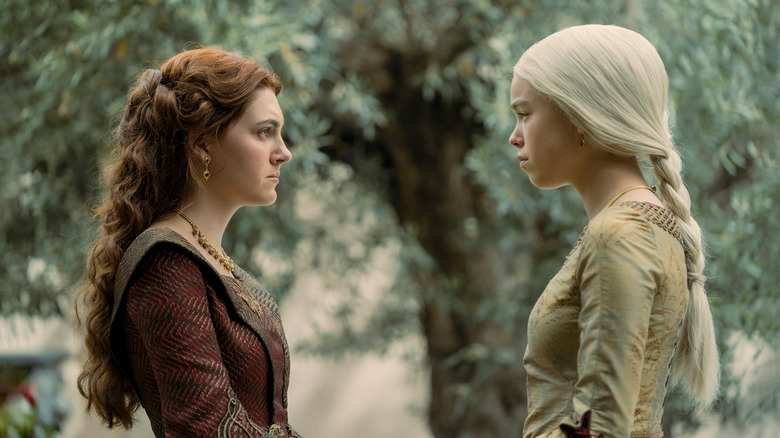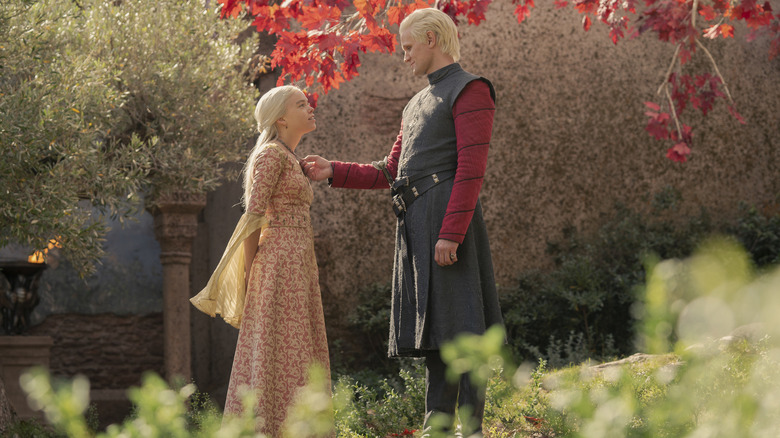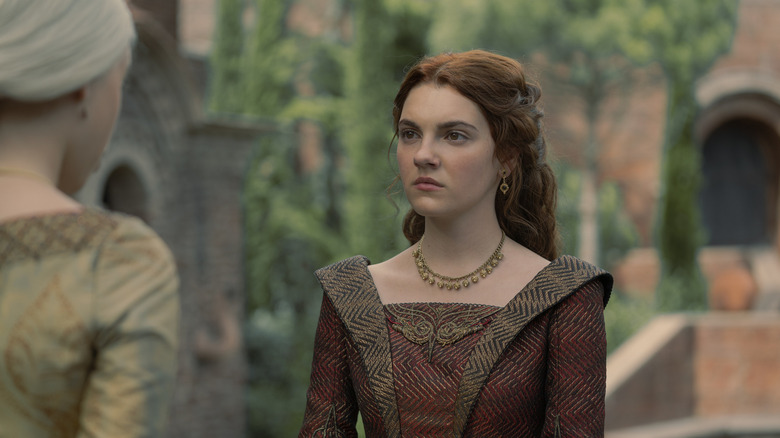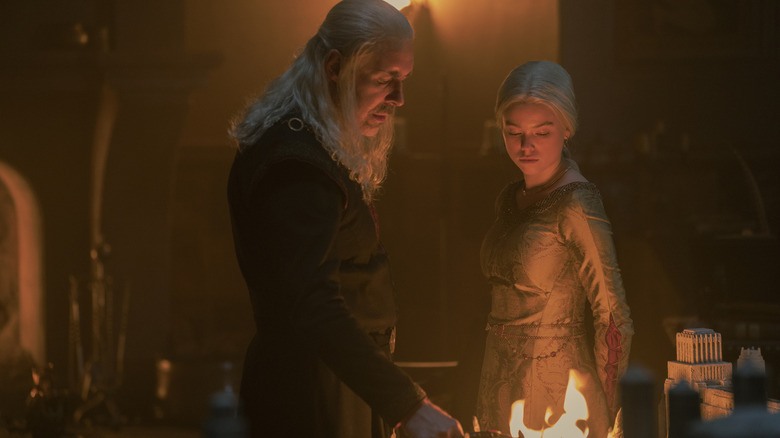House Of The Dragon Finds Its Magic In Its Smallest Scenes
Dragons. Incest. A war waged against a brutal pirate who more than earned his nickname as the Crabfeeder. Four episodes into "House of the Dragon," and the series has unfolded more or less as you'd expect from a prequel to "Game of Thrones." The dragons have established themselves as an integral part of the series from the start, the, uh, overtly intimate family relations arrived right on time in last night's episode, and, if anything, the violence depicted in brief flashes thus far has been even more unfiltered and provocative than where the original series left off. But in episode 4, titled "King of the Narrow Sea," the show's real strength rose to the fore and proved that it hardly needs spectacle and battle to remain worth watching.
After the previous week ended with Daemon Targaryen's (Matt Smith) one-man show to end the War for the Stepstones for good, the latest hour takes a remarkably more measured pace in dealing with the aftermath. All the courtly intrigue and political jockeying and concerns about what makes a good ruler (or not) that we remember from the early seasons of the parent show have still been foregrounded, much as they have right from the opening moments of the "House of the Dragon" premiere. But more so than in any other, this episode takes that to an extreme by essentially staging one conversational scene after another, almost all of them only involving two major players in each moment.
"House of the Dragon" got downright talky ... and the results have never been more compelling.
Tell us how you really feel
Although it bears noting that both shows have completely different aims and ambitions, "House of the Dragon" nonetheless contains a few significant advantages over "Game of Thrones." One of them has to do with the specific kinds of characters included in this story versus the previous narrative. While the main cast of "Game of Thrones" featured silent, brooding hero types (looking at you, Jon Snow!) with very little in the way of expressive dialogue, the always drama-filled soap opera antics of the Targaryen family in "House of the Dragon" couldn't be more opposite.
Take Rhaenyra (Milly Alcock) and her uncle Daemon reuniting after four years apart, for example. With all sorts of uncomfortable undertones to their conversation, the pair frankly discuss the differences in marriage duties between men and women; the currently married Daemon, lest we forget, hasn't even been seen with his actual wife since the show began, while Rhaenyra is doomed to endure countless ill-fitting matches in her father Viserys' (Paddy Considine) quest to marry her off for political gamesmanship. Here, the seeds are well-planted for Daemon's eventual attempts to "corrupt" his young niece and take advantage of her need for freedom in her budding love life.
Skin-crawlingly disturbing undertones aside, however, even these scenes feel refreshing. As enjoyable as all the small council scenes are, these proceedings are dominated by various advisors trying to manipulate the king with hidden agendas and double-speak suggestions. Rhaenyra and Daemon, meanwhile, say exactly what they mean at all moments. Although that leads to no shortage of complications and unsavory acts by the end of the episode, such scenes between the two Targaryens stand out for more or less telling it like it is in an impressively character-centric way.
A frayed friendship
Once Rhaenyra and Daemon's ill-advised tryst out in the streets of King's Landing and eventually in Daemon's favorite brothel begins to come to light, "House of the Dragon" returns us to perhaps the most central relationship in the entire show. Although we were unfortunately deprived of more scenes between Rhaenyra and Alicent Hightower (Emily Carey), Alicent's marriage to Viserys and the further muddying of waters regarding the succession drove a wedge between the onetime friends that hasn't been easy to overcome ... but that ice finally began to thaw here.
Though in their own initially guarded way, the two open up about their wildly opposing views of having an entire kingdom of suitors after Rhaenyra's hand in marriage. Nothing but a source of annoyance for the princess, Queen Alicent sees the notion as "romantic" — giving us a telling clue that the young girl who read to Rhaenyra under a heart tree still remains inside, even if she's now Queen of the Seven Kingdoms and mother of the child whom many consider to be the next heir to the Iron Throne. In spite of their political rivalry, and even though the respite will prove to be short-lived, the shockingly heartfelt moment where Rhaenyra reaches out to hold Alicent's hand packs just as much of a punch as any of the show's more lively and energetic sequences.
Of course, this is still a show set in the "Game of Thrones" universe and all those good feelings come crashing down when Alicent confronts Rhaenyra over the allegations involving her uncle Daemon. Yet even amid all the scheming and power plays and suspicions, these scenes provide a vital foundation to hold onto for when the show inevitably jumps forward in time and recasts both roles with older actors.
A reminder of what it's all about
Ultimately, everyone has their own reasons for once again tuning in to another show set in world of Westeros, whether it be for more quintessentially "Game of Thrones" battle sequences or impossibly dense lore courtesy of author George R.R. Martin or the unique pleasures of watching all sorts of complex characters scramble to play the game of thrones.
Perhaps no scene in the newest episode of "House of the Dragon" provides a better intersection of these differing aims than the sequence between Rhaenyra and her father, Viserys. After neatly segueing into more Aegon the Conqueror backstory as the two muse over a certain Valyrian steel dagger (a very familiar-looking one, for those who remember the role it'll eventually play during the events of "Game of Thrones"), Viserys proceeds to unleash his entire pent-up anger on his rebellious daughter over her reckless behavior. Having already banished Daemon, the king moves to match Rhaenyra with Corlys Valaryon's (Steve Toussaint) son Laenor (Theo Nate) in a marriage betrothal that will further strengthen the Targaryen grip on the Iron Throne and unite the two quarreling houses.
But for all the political and heightened fantasy backdrop to this scene, at its heart it's really just about a father and daughter struggling to communicate with one another — which they've always had difficulty with. The clashing of personalities and completely different perspectives plays out more or less as you'd expect ... until Rhaenyra deftly poisons her father against Hand of the King Otto Hightower (Rhys Ifans), removing her chief political rival from the picture completely.
All of these two-hander dialogue scenes throughout the episode fill multiple different purposes at once, adding up to one thoroughly entertaining episode that knows that, sometimes, words speak louder than actions.



